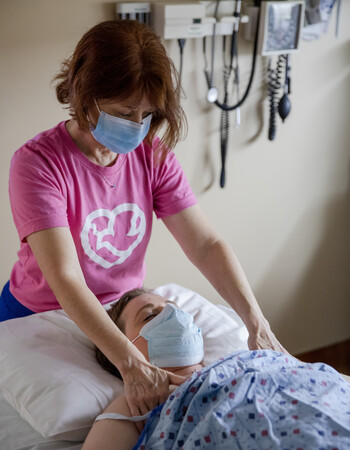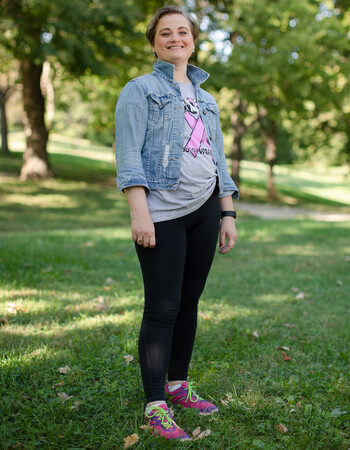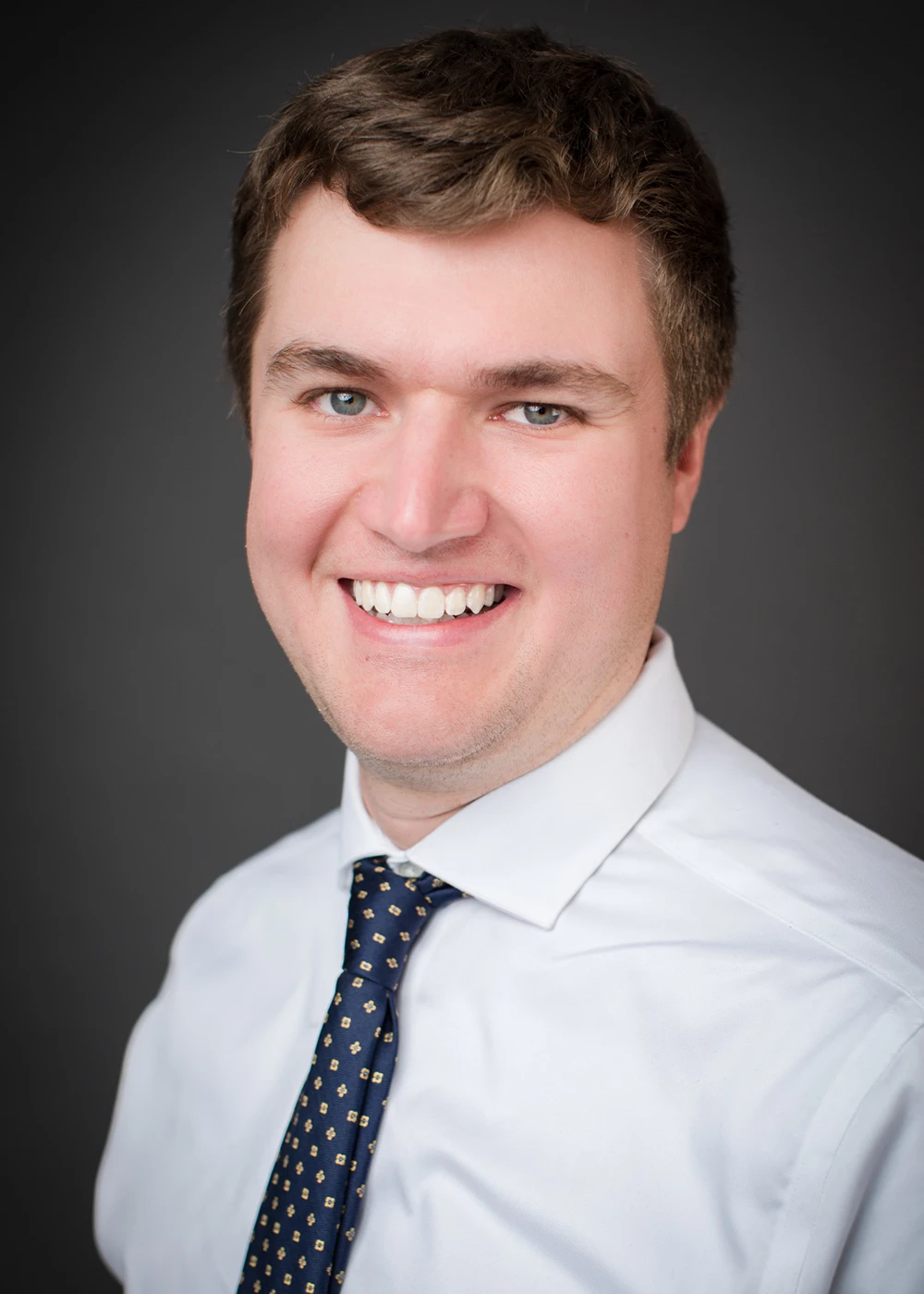
The Meaning of Care Magazine
Young Cancer Survivor Leans on Methodist's Support Services To Find Her ‘Best Quality of Life’
Published: Dec. 12, 2022Empowered.
That’s how Julia Laursen, 33, feels because she can see the impact of the support she’s received throughout her cancer survivorship.
“That’s the big thing that the support services do,” she said. “It’s just this sense of, ‘We’re going to empower you to make the best, healthiest life choices that you can so you will have the best quality of life.’”
As a young cancer survivor, Julia feared she wouldn’t have her unique needs met, such as returning to work and planning for the many years ahead of her.
“But Harper’s Hope made sure they understood my goals and empowered me,” she said.
Major Life Changes
As an emergency department travel nurse, Julia loved the adrenaline rush of helping provide care in crises. But after a diagnosis of inflammatory breast cancer – a rare and aggressive form – just weeks after her 32nd birthday in January 2021, she needed to allow others to care for her.
Julia received chemotherapy that spring and summer. Then in September she underwent a double mastectomy with removal of lymph nodes under her right arm, a procedure to minimize lymphedema – or swelling that can result from cancer – and the removal of her ovaries and fallopian tubes.
She completed radiation therapy a few months after surgery and started oral chemotherapy not long after.
Because of all the changes in her life, Julia relied on multiple resources for support, including those offered through the Harper's Hope Cancer Survivorship Program – a comprehensive cancer survivorship program at Methodist Estabrook Cancer Center (MECC) that offers services to help improve survivors' quality of life.
Unsung Heroes
Julia referred to Wendy Buchholz, OTR/L, CLT-LANA, and Beth Sunderman, PTA, CLT, as “unsung heroes” during her cancer journey.
“They have changed my life,” Julia said.
She started seeing Buchholz in October 2021 because of her high risk of lymphedema following surgery. Through education that Buchholz provided, Julia learned about the lymphatic system and found different styles of lymphedema garments, which allowed her to wear tops other than T-shirts.

In January, Julia began a new job as the school nurse at Ralston High School. With the start of a new routine, she struggled with back pain and posture deficiencies, which prompted her to start seeing Sunderman for physical therapy.
“People don’t realize that when you get a double mastectomy, your whole posture changes,” Julia said. “I couldn’t sit on the sofa. I couldn’t sit at work. It was awful.”
Julia spent six months in a back brace, but Sunderman helped her improve her posture, which allowed her to sit for long periods of time without pain or the assistance of the brace.
Because Julia worked on a school schedule, Buchholz and Sunderman accommodated her so she didn’t have to miss work for the majority of her appointments. For example, Sunderman offered Julia multiple exercises to complete at home to fit her schedule.
“When you’re going through cancer treatment, there’s a lot of appointments, and it can be very disruptive, but it can also be really overwhelming,” Buchholz said. “So I try to make it work as best as I can for the patient.”
Although being a school nurse isn’t as exhilarating as the emergency department, Julia is glad to have the opportunity to be working while continuing to progress on fitness and life goals.
“They’re helping me build back up my endurance and get back to where I want to be,” she said. “I’m younger for breast cancer. I went through every treatment modality. I’ve had a lot of struggles, but they just keep me going.”
Multiple Sources of Support
In addition to the lymphedema program and physical therapy, Julia received support from Methodist’s Inner Beauty Salon, behavioral health and psycho-oncology services, and oncology nutrition services.

“I feel like there’s all these people just rooting for me and wanting me to be the healthiest I can be in this new ramshackle body that’s parts and pieces put back together,” Julia said. “They’re making sure that this old Honda Civic is still going to chug along for a lot more years.”
The Inner Beauty Salon helped Julia gain confidence in her appearance, including fitting her with a stylish and trendy wig.
“That was the first time after losing my hair that I really looked like myself,” Julia said. “People didn’t even know it was a wig.”
Because of her surgery, Julia experienced early menopause. One side effect that hit her the hardest was not being able to sleep, which led to ramped-up anxiety.
She connected with psychologic oncologist Jane Theobald, MD, who helped her recognize that her emotions were understandable.
“She made me really feel like, ‘You’re not crazy; you’ve had so much done to your body. We’re going to get you better. We’re going to get you to a new quality of life. It won’t be the normal you knew, but we’re going to get you as close as we can,’” Julia said.
Julia also worked with the oncology nutrition services to begin a new diet that fit her needs. She acknowledged that as a busy emergency department nurse, she often neglected her nutrition. But now she follows a regimen that’s helped her lose weight and feel better.
“She just has lots of resources,” said Melissa Hernandez, MD, Julia’s primary care physician. “And to have all of those resources is empowering, knowing that there’s a team behind you and you’re not alone.”
“I often feel that patients benefit so much from those extra support services, and that’s why I’m recommending them so often,” said Mary Wells, MD, Julia’s oncologist with Nebraska Cancer Specialists. “I really feel like I can see the difference in their emotional well-being, physical strength and overall outlook when they have that extra support from the different disciplines that participate in cancer care.”
The Harper’s Hope services are made possible through a gift from The Harper Family Foundation to Methodist Hospital Foundation.
"Harper’s Hope is a very special program to our family,” said Betsy Murphy, a trustee of The Harper Family Foundation. “It was created by my father after we lost my mother (Josie Harper) to cancer. Our family believes that the support services offered by Harper's Hope can make a big difference to cancer survivors and to their caregivers. It's heartwarming to know that these services can provide education and encouragement to improve a survivor’s quality of life. We're also so appreciative of the caring professionals that do such an amazing job of providing these special services.”
When asked which support service stands out most, Julia said she can’t choose.
“Each one just plays such a key role in recovery and survivorship. I can’t really just pick one because they’ve all been phenomenal in changing my life.”
Positive Attitude
Even though Julia sees both Buchholz and Sunderman as heroes, the two therapists can’t help but notice how much work Julia has put in to get to where she is today.
“She’s been incredibly resourceful and incredibly brave,” Sunderman said. “She has really learned to do the things that she can to make herself better, and she’s focusing on that. I see her being less scared and just presenting herself with more confidence.”

“It’s a whole different experience to be a survivor when you’re in your 30s than when you’re in your 50s, 60s or 70s,” Buchholz said. “You’re looking at a long survivorship, whereas those who are diagnosed later may not. I really admire that she seems to have a very positive attitude and she reaches out and looks for what she needs.”
Julia knows that her philosophy on life has transformed from before cancer to where she is now.
“My mindset has totally changed, and I’m a much happier person,” she said. “And I’m focused more on things that matter.”
More Resources
- Read more from the winter 2022 issue of The Meaning of Care Magazine.
- Visit the Harper's Hope Cancer Survivorship Program section of our website.
- Learn more about lymphedema therapy services offered at Methodist.


